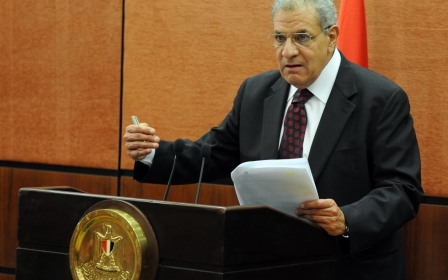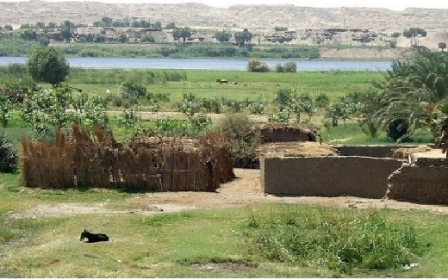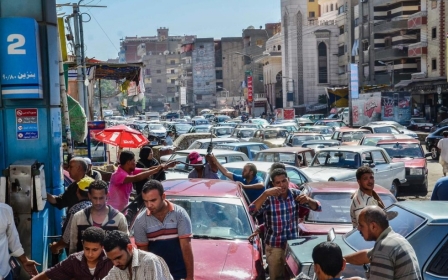Egypt's power outages continue to intensify

A huge power outage caused black-outs across Cairo on Thursday causing major disruption across the city of some 20 million people at the height of the morning rush hour.
Services were completely suspended on one of the city's three metro lines and heavily disrupted on a second, the state MENA news agency reported. The electricity outage brought subway services in Cairo to a complete halt, inconveniencing the roughly 3.5 million Egyptians who use it every day.
Water supplies to households and businesses were also disrupted, while the power outage also affected numerous state institutions including state television channels and radio stations which could not air without electricity to run their facilities.
Energy ministry spokesman Mohamed al-Yamani said that "power is gradually being restored" after a fault cut supply to "some Cairo neighbourhoods".
But two hours later, the whole of the city centre and several outlying districts were still without electricity, as temperatures rose towards their midday high, which can often top 40 degrees Celsius in the summer.
Outside of Cairo, electricity cuts spread across five southern governorates – Minya, Asyout, Beni Sueif, Fayoum and Wadi Algedid – putting the residents into a complete standstill from 6.00 am local time, reported Almasry Alyoum.
Alaa Abdel Aziz, director of Egypt Electric, one of the companies providing the southern governorates with their electric supply, told the Egyptian daily that while the reason behind the power cuts was not clear, the company was doing its best to restore power throughout the country as soon as possible.
But reports from the ground revealed that many of Egypt’s governorates remained in partial darkness throughout the whole day.
Government officials and consultants said a technical problem had caused the power outage.
A technical mishap or "glitch caused the national electricity grid to lose around 9,000 megawatts of its generation capacity, leading to power outages in most provinces," Electricity Minister Mahmoud Shakir said.
The lost 9,000 megawatts account for 39 percent of Egypt's total electricity generation capacity, an Electricity Ministry official told Anadolu Agency.
The official, who asked not to be named, said Egypt's electricity plants were currently generating between 22,000 and 23,000 megawatts of electricity daily.
Egypt's power plants have a daily generation capacity of 30,000 megawatts, the official noted, adding that fuel shortfalls were preventing them from operating at full capacity.
“According to the national control centre, one of the major transmission circuits in the network was suddenly overloaded due to an operational error, causing the network to trip,” said Mohamed El-Sobky, an electrical power engineering professor at Cairo University.
“Because the system is already critically balanced, the network could not withstand this human error because protection elements used to isolate a faulty part of the network could not function,” he explained.
Wider problem
Thursday morning's outage was the most extensive in years, as investment in generation has failed to keep up with rising population numbers amid the economic woes plaguing the country since President Mubarak was in power.
“The minister came out in the morning saying a similar incident took place in the 1990s, but an outage on this scale has never happened in Egypt before,” Selim Azouz an Egyptian journalist told Aljazeera Mubasher.
While Thursday’s blackout is supposedly unprecedented, Egyptians have been suffering intermittent power cuts - often lasting for an hour each and up to seven or eight times a day – which have peaked throughout August’s blistering temperature highs.
As consumers try to switch on fans and air conditioning units across the vast metropolis, supply has routinely failed to meet demand in the summer, forcing authorities to impose rolling power cuts neighbourhood by neighbourhood.
While, gas shortages as well as antiquated and insufficient power plants have been the main reasons for the power cuts, Egyptian officials have also blamed high consumption rates and saboteurs seeking to undermine the government for the outages.
Interior minister Ibrahim Mahlab said on 16 August at a Cairo press conference that 300 attacks on electricity pylons nationwide have deepened the crisis leading to a drop in production by up to 15 percent.
“Without sabotage, we already have a problem. This is increasing the problem to paralyse us totally,” he said.
State television and private pro-government media have regularly reported such attacks, usually referring to the assailants as supporters and members of the Muslim Brotherhood group of ousted President Mohammed Morsi.
Sobky however says that while attacks on power plants and transmission lines are in fact taking place, the impact of those explosions is containable and not the main reason behind the power cuts.
The government has promised that come September with its relatively cooler temperatures, the power cuts would be reduced, but Egyptians complain that the situation is worsening.
“Our business are down because of these outages; without electricity we can’t work. We really can’t afford any more of this,” said Mohamed Ali, a dry cleaners owner in down-town Cairo.
“I don’t see anything getting better; everything is actually worse since Sisi came to power,” said Sara Moataz, a 27-year-old public relations manager from Cairo.
“Everything is more expensive, the price of petrol has doubled and we have regular power cuts all the time. If terror attacks are the problem, the government has to step up security in those areas,” said Moataz.
Ahmed Adel, a 22-year old mechanical engineering student from Cairo says the power cuts have become intolerable and believes government’s response to people’s complaints are increasingly unsatisfying.
"I’ve got used to eating in the dark and climbing the stairs in the dark. I’ve even become a pro at driving in the dark,” said Adel.
“They [the media and government] told us things would get better, but it’s all the worse,” he told MEE.
Among the main grievances which brought Morsi down in 2013 were the power outages, petrol shortages and increasing basic commodity prices.
An expected outcome
The rolling blackouts come amid an energy crunch linked to shrinking revenues, depleted natural gas resources, lack of maintenance on debilitated power plants, and the government's inability to pay its debts to foreign oil companies.
The power outages are a "result of cumulative under investment over many years; successive governments have failed to invest in power generation and in transmission lines," said Nick Butler, chair of the King's Policy Institute at King's College London.
"They [the power cuts] are due to years of neglect and the government's inability to import enough fuel," he added.
According to Sobky, “The indications of this crisis were apparent at least 10-15 years ago."
He says the problem is three-fold: bad maintenance, lack of fuels and high and inefficient consumption of Egypt’s energy supply.
“Eighteen to twenty percent of Egypt’s capacity is inaccessible due to bad maintenance. Several power stations are not operating at their full capacity because of this. But in order to attend to the power stations and carry out the maintenance work needed, they must be stopped – a luxury Egypt cannot afford at the moment,” Sobky told MEE.
Sobky is part of a seven-member committee - including the Egyptian ministers of electricity, petroleum and finance, two academies from the field of electrical engineering and two members of Egypt’s engineering military academy – which has submitted a report to the Egyptian government a week ago, proposing long and short-term resolutions to the continuous power cuts in Egypt.
However, not only are the power plants in dire need of maintenance and repairs, but also, “the transmission lines and infrastructure used to distribute electricity across the country require work," said Ahmed (not his real name), a project manager working in the ministry of electricity.
Economic policy
Analysts say that the political decisions taken by the Mubarak administration have confounded the problem.
“Egypt’s power supply crisis occurred as a confluence of various political choices that took place in the late 90s and early 2000s. Mubarak decided in the late 90s to privilege natural gas production and consumption at the expense of oil in order export more oil abroad,” said Justin Dargin, a Middle East energy expert at the University of Oxford.
Dargin explained that while Egypt’s policies which encouraged fuel switching in the power sector from oil to natural gas were sound during the early 2000s, production stagnated and new investment was not forthcoming while consumption increased substantially. This led to declining natural gas production which hit the sector hard.
“The root of the problem is the energy subsidy regime which did not encourage new investment in maturing gas fields and also encouraged the populace to consume significant amounts of power,” Dargin told MEE.
On 5 July, Sisi’s government imposed a 78 percent increase in basic fuel prices, a move to reverse the subsidy scheme.
While Dargin says that the energy subsidy reform is a positive step that will create incentives for investment and allow the power sector to make needed investments to upgrade its infrastructure, Butler believes that although the move will reduce the cost of subsidies, it will also cause much hardship to Egyptians and will damage the economy.
"Reducing the subsidies is rational but this move is too rapid. The reduction in subsidies should have been much more gradual," Butler told MEE.
The increases which are designed to reduce Egypt’s enormous subsidy bill have added to the problems of individuals and business struggling to survive, wrote Butler in The Financial Times on 3 August.
Egypt suffered its first major blackout in 2008; the blackouts have been increasing both in scope and intensity every year since.
Experts say that while Egypt has lots of natural gas, Egypt has not been able to access its resources because of a lack of finance and due to dwindling security in the country.
“Egypt has significant amounts of natural gas underneath its soil, but the problem has been in producing it. With the subsidy framework, investment in the power and natural gas sector has been discouraged,” says Dargin.
Sobky agrees: “Egypt has not been able to tap into its resources because it is too expensive; power generation expansion plans became conservative due to a lack of finance and there were no measures to curb a growing demand."
A lack of security in Egypt since the 2011 uprisings has discouraged multinational companies from investing and working in Egypt. Several agreements in the sector have not gone forward.
“Egypt had an exploration and production sharing agreement with British Petroleum. It was approved by parliament in 2010 and was supposed to cover 20% of Egypt's current needs. Production should have started in 2013 but did not,” said Sobky referring to the lack of security.
Four more years
Shakir, the minister of electricity has made statements that the root of the problem will take up to four years to be resolved.
Experts say, "it will take at least one to two years for major changes to be witnessed,” Dargin told MEE.
With too much demand and little supply, the Egyptian government has called on citizens to reduce their consumption to help relieve the situation.
According to Dargin, Sisi's steps to reverse Egypt's subsidy reform framework should reduce energy consumption as well.
“An energy efficiency campaign would be useful. It would incorporate governmental grants/tax breaks for industrial users and the residential sector,” he added.
As a means to increasing gas supply, the petroleum minister, Sherif Ismail, said in August his ministry would provide larger amounts of gas over the next months to fuel power stations.
Egypt and Israel have been reportedly finalising a deal that could mean the sale of $60 billion in Israeli natural gas to liquefaction plants in Egypt.
The deal may relieve Egypt of its lack of fuel supplies which has contributed to the power cuts, and would also be a reversal of a years-long gas flow between the two countries in which Israel paid some of the lowest natural gas prices in the world to Egypt.
"While the main driver behind Egypt's energy crisis is the energy pricing, selling natural gas at below market rates exacerbated Egypt's supply problems," explained Dargin.
"Egypt's production was decreasing and consumption increasing, while the country continued to sell gas abroad. This led to further tightening of supplies ..[and] intensifying the power blackouts and gas supply disruptions," he told MEE.
Butler however says: “The issue is not a shortage in generating capacity, but the country’s inability to import the raw materials necessary to produce power. Egypt already relies on cheap oil and gas from its Arab friends and cannot afford to import the extra supplies which the system needs,” he wrote in The Financial Times.
"The country needs to import oil and gas to produce more electricity through existing power stations which will require significant loans," Butler told MEE.
"It will take many years to reverse the situation. Egypt needs to invest in infrastructure and power stations which will take at least two to there years to build, but Egypt lacks the capital and will have to borrow," he explained.
The Egyptian government is struggling to address the country's floundering economy and increasing debts.
In an attempt to help Egypt overcome its lack of funds, Yamani announced on 28 August that the ministry of electricity has initiated a campaign encouraging employees and citizens to donate towards ‘Long live Egypt’– a fund that will be used to help 16 electricity companies linked to the ministry produce, transport and distribute power throughout the country.
But the lack of funds are a much deeper problem than one that can be addressed through employees' donations and experts say huge economic reforms are needed to resolve the issue.
A consortium of local banks is set to secure a $1.4 loan for the Egyptian General Petroleum Corporation to pay back debts to foreign oil companies, reported Al-Ahram's daily newspaper on 2 September.
"All that [reform schemes] will take time, but the first step is to stabilise the economy and return growth," he added.
New MEE newsletter: Jerusalem Dispatch
Sign up to get the latest insights and analysis on Israel-Palestine, alongside Turkey Unpacked and other MEE newsletters
Middle East Eye delivers independent and unrivalled coverage and analysis of the Middle East, North Africa and beyond. To learn more about republishing this content and the associated fees, please fill out this form. More about MEE can be found here.




